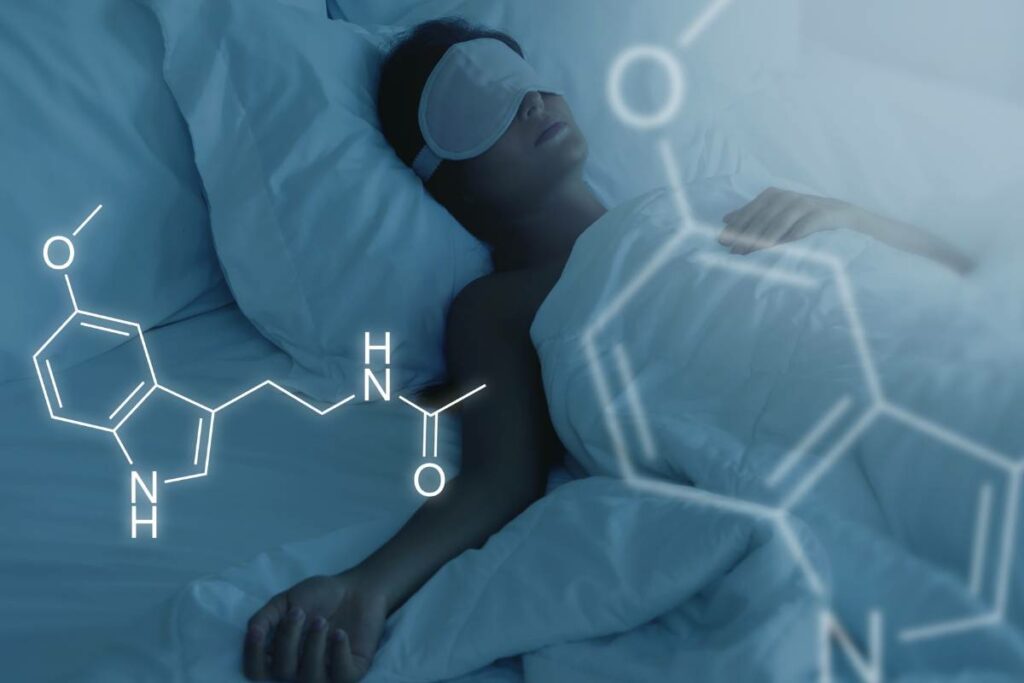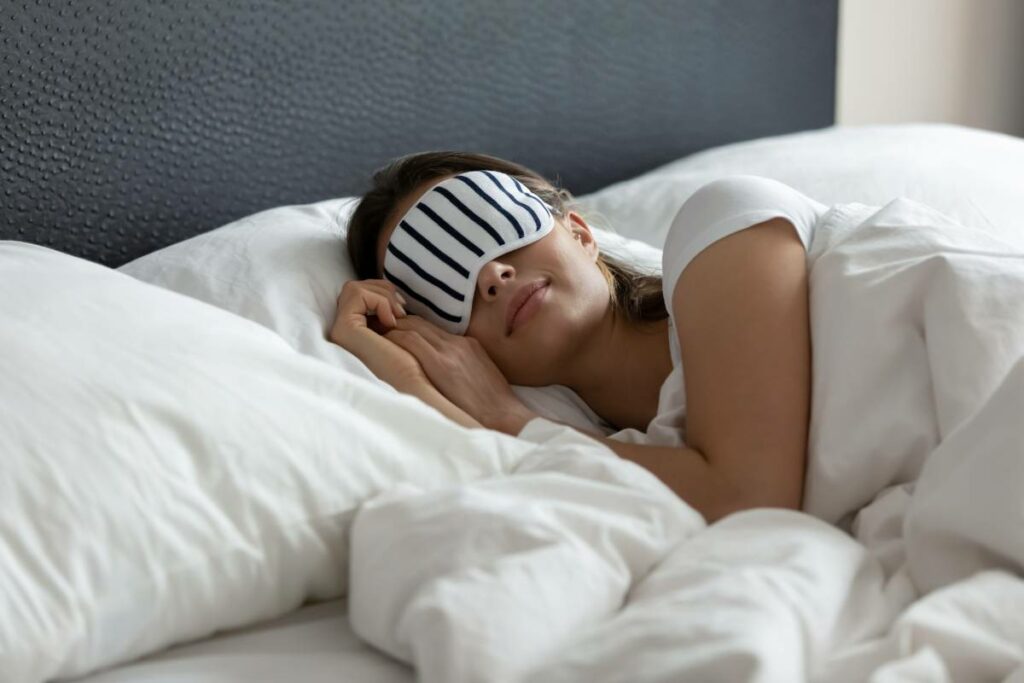The Connection between Quality Sleep and Weight Loss
Welcome to the fascinating intersection where sleep and weight loss meet! As counterintuitive as it may seem, sleep—a time when we’re the most inactive—plays a crucial role in our weight loss journey.
Let’s explore the importance of quality sleep in managing your weight.

This post may contain affiliate links, which helps keep this content free. Please read our disclosure for more info.
The Science Behind Sleep and Weight Management
Our body is a highly complex and well-coordinated system. During sleep, essential metabolic processes continue, highlighting the active nature of this resting state.
Understanding these processes provides insight into the relationship between sleep and weight management.
Sleep serves multiple functions beyond rest and rejuvenation. Key among them are crucial metabolic functions necessary for maintaining a healthy body weight.
These include the regulation of blood sugar levels, hormone production and release, and body temperature, among others.
One significant sleep-related metabolic process involves the hormone insulin, responsible for managing blood sugar levels.
During deep sleep stages, the body’s insulin sensitivity increases, which aids in the effective absorption of glucose by cells for energy use.
However, when sleep quality or duration decreases, this sensitivity can diminish, leading to higher blood glucose levels in the bloodstream.
Persistent high blood sugar levels, or hyperglycemia, can result in insulin resistance—a condition that often contributes to weight gain and can even lead to type 2 diabetes.
The Impact of Sleep on Hormones Related to Appetite and Weight

The body’s control over hunger and satiety is a fascinating interplay of hormones and neurological signals, with sleep playing a starring role.
Among the key players in this process are leptin and ghrelin, hormones that primarily function to regulate appetite.
Leptin, often referred to as the “satiety hormone,” is produced by the body’s fat cells and signals to the brain when we’ve had enough to eat.
Ghrelin, conversely, is known as the “hunger hormone” as it sends signals to stimulate appetite when the stomach is empty.
Together, these hormones maintain the balance of energy intake and usage in the body—a balance that can be significantly disturbed by sleep deprivation.
When we don’t get enough sleep, leptin levels tend to decrease while ghrelin levels increase. The resultant effect is an increase in hunger and appetite, and a reduction in feelings of fullness after eating.
This disruption in hormonal balance can lead to increased calorie intake, and consequently, weight gain. It’s also worth noting that sleep-deprived individuals often crave high-carbohydrate and high-fat foods, further amplifying the risk of excessive weight gain.
Scientific research strongly underscores the impact of sleep deprivation on these appetite-regulating hormones. Numerous studies have found a consistent correlation between short sleep duration and increased body mass index (BMI).
In one notable study, subjects who slept less than five hours per night were observed to have reductions in leptin and elevations in ghrelin. In contrast, those with regular sleep patterns maintained a healthier balance of these hormones.
Sleep Quality and Its Influence on Exercise Performance

Sleep is not just a time for the body and mind to rest—it’s also a critical period for recovery and repair, especially when it comes to exercise performance.
After a session of physical activity, the body needs time to recover and replenish its energy stores, and much of this process happens during sleep. Inadequate or poor-quality sleep can significantly impact our physical performance.
From a physiological perspective, sleep deprivation can decrease glucose metabolism and glycogen synthesis—processes that are vital for energy production. This can leave us feeling fatigued, and our workout performance can suffer as a result.
Lack of sleep can also lead to slower reaction times, reduced endurance, and lower motivation to engage in physical activity.
The quality and duration of sleep directly impact muscle recovery. During sleep, particularly the stage known as slow-wave sleep, the body releases growth hormone which stimulates muscle repair and growth.
Less sleep means less time in this reparative phase, leading to prolonged muscle recovery times and decreased athletic performance.
Sleep also influences our cognitive function, which is crucial for staying motivated, maintaining focus, and achieving our fitness goals.
Sleep-deprived individuals often experience decreased motivation to exercise and a perceived increase in exertion during physical activity, even though the actual physical effort may not change.
By ensuring we get sufficient, quality sleep, we allow our bodies to recover and rejuvenate adequately. This enhances our energy levels, exercise performance, and capacity to burn calories, all of which are essential for weight loss and overall physical health.
Prioritizing sleep can mean the difference between a lackluster workout and one where you’re at your best—energized, focused, and ready for action.
Sleep Hygiene: Practices for Improving Sleep Quality

The term “sleep hygiene” refers to a series of habits and practices conducive to sleeping well on a regular basis.
As integral to our well-being as brushing our teeth or washing our hands, maintaining good sleep hygiene can lead to improvements in sleep quality and overall health, including aiding weight management.
Establish a Consistent Sleep Schedule
Our bodies operate on a circadian rhythm, an internal clock that regulates periods of sleepiness and wakefulness. By sticking to a consistent sleep schedule—going to bed and waking up at the same time each day—we can reinforce this natural rhythm and improve our sleep quality.
Create a Sleep-Inducing Environment
The ambiance of our sleep environment can significantly impact our ability to fall asleep and stay asleep.
This involves factors like temperature (the cooler, the better), noise (consider a white noise machine if you live in a noisy environment), light (darker rooms promote better sleep), and comfort (a quality mattress and pillow can make a world of difference).
Limit Screen Time Before Bed
The blue light emitted by phones, computers, and TVs can interfere with our bodies’ production of melatonin, a hormone that regulates sleep. To improve sleep hygiene, try to disconnect from screens at least an hour before bedtime.
Adopt a Pre-Sleep Routine

Just as children benefit from bedtime routines, adults can also use a relaxing pre-sleep routine to signal to their bodies that it’s time to wind down.
This could include activities like reading a book, taking a warm bath, or practicing a relaxation technique such as meditation or deep breathing.
Watch What You Eat and Drink
What we consume can have a significant impact on our sleep. Try to limit caffeine and alcohol, especially in the hours leading up to bedtime.
Also, avoid large meals close to bedtime, as they can cause discomfort and indigestion, making sleep elusive.
Stay Active
Regular physical activity can help you fall asleep faster and enjoy deeper sleep. However, try not to exercise too close to bedtime as it can interfere with your ability to fall asleep.

By integrating these sleep hygiene practices into our daily routine, we can enhance our sleep quality.
Better sleep, in turn, can contribute to improved exercise performance and weight loss, reinforcing a virtuous cycle of health and well-being.
Transform Your Health with Quality Sleep and the 21-Day Fat Loss Challenge Program
Wrapping up our exploration of the relationship between sleep and weight loss, it’s crucial to emphasize the active role sleep plays in our health and fitness journey.
But it’s not just about sleep—diet and exercise play their part too. This is where the 21-Day Fat Loss Challenge Program comes in.

The 21-Day Fat Loss Challenge Program is a comprehensive plan designed to create significant and transformative changes to your body and overall health.
This carefully crafted program aims to help you lose 10-21 pounds and drop 2-3 dress sizes. It’s not just about the numbers on the scale; you’ll also notice your clothes fitting better, a slimming of 3-4 inches from your waistline, and improvements to your skin and hair quality.
That’s not all—participants often report experiencing fewer aches and pains, particularly in the joints.
While the program incorporates regular exercise and a healthy diet to achieve these results, sleep stands as the third, equally crucial pillar of any effective weight loss and wellness program.
As you sleep, your body is at work—repairing muscles, balancing hormones, and regulating your metabolism, all of which are essential for weight loss.
So, as you begin the 21-Day Fat Loss Challenge Program, remember to pay attention to your sleep. It’s more than just ‘shutting down’ for the night—it’s a vital component of your weight loss journey.
When you manage to integrate quality sleep with nutritious eating and consistent exercise, you create an optimal environment for weight loss. You’re not just dreaming about success—you’re laying the groundwork for it every night!

